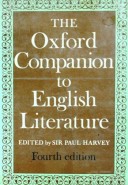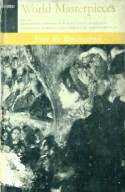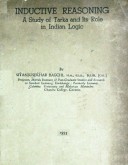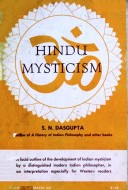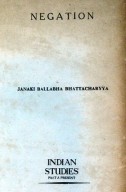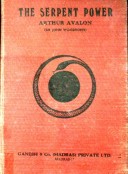Tìm Sách
Sách tiếng Anh-English >> The Oxford Companion to English Literature
Thông tin tra cứu
- Tên sách : The Oxford Companion to English Literature
- Tác giả : Sir Paul Harvey
- Dịch giả :
- Ngôn ngữ : Anh
- Số trang : 960
- Nhà xuất bản : Oxford-Clarendon Press
- Năm xuất bản : 1967
- Phân loại : Sách tiếng Anh-English
- MCB : 12100000011640
- OPAC :
- Tóm tắt :
PREFACE
This volume will serve its purpose if it proves a useful companion to ordinary everyday readers of English literature. It is necessarily a work of compilation and selection, because the range of the possible subject-matter is so great. English literature has a continuous history of over a thousand years, it has been produced in many lands, and there is no subject on which it does not touch. Completeness in a moderate compass, and the equipment of a specialist at all points, are therefore impossible.
According to the general scheme of the work, as designed by the publishers, two main elements are included, in alphabetical arrangement. The one is a list of English authors, literary works, and literary societies which have historical or present importance. Under an author’s name is given a selection of facts— especially dates—bearing on his life and literary activity. Under the title of a work there is some indication of its nature, and for the greater works of fiction of the past—whether poetry, prose, or drama—there is usually a brief sketch of the plot. American literature is an essential part of the literature of our language, and a certain number of American authors and of their works, those best known in this country, have been treated on the above lines. Original literary appreciation is not attempted, and comments verging on aesthetic criticism are intended to give rather a conventional view of the importance and distinctive qualities of the author or work under discussion. In this part of the volume, where a compiler must often plead for the indulgence of experts, living authors present the hardest problem. Contemporary judgement is notoriously fickle and tends to be impassioned. I could have wished to exclude all living authors; yet some have established reputations that can hardly be ephemeral, and some may claim at least a place beside the popular favourites of other days. I have therefore, on advice, given very brief entries to a limited number of living authors and recent works; but without finding a criterion of choice that satisfies me. I must apologize to those whose merits I have unintentionally neglected, and ask readers to pass lightly over errors of selection on this difficult borderland. After all, it comprises only one of some fifty generations of English authors.
The other element is the explanation of allusions commonly met with, or likely to be met with, in English literature, in so far as they are not covered by the articles on English authors and works. The selection is limited to allusions which contain a proper name, with a few special exceptions: some literary terms, some names of wines, and names of old coins like ’gold moidores’ and ‘pieces of eight’, which are more than mere common nouns to readers of English. Even among proper names the number of possible entries is huge. Apart from the characters of English fiction, one must reckon with names from several mythologies, with saints, heroes, statesmen, philosophers, men of science, artists, musicians, actors, with literary forgers and impostors—in short, with every kind of celebrity. In order to restrict the field of choice I have had to bear in mind that this is not a dictionary of mythology, or history, or science, or music, but a companion to English literature, and therefore to look at all such special subjects through the mirror of English literature. It is sometimes a distorting mirror. Thus foreign authors are included as matter of allusion in English, not on any scale of merit which would satisfy students of those literatures. Eustache Deschamps, for instance, appears because of his relations with Chaucer, though many great figures in French literature are passed over. In the selection of place-names, the grounds of choice are similar. A volume of this size would not hold all the places referred to in English writers of some standing. But Grub Street and Fleet Street have associations which greater thoroughfares do not share; Harvard and Yale have claims to inclusion over and above their merits as universities; Mount Helicon must be preferred to Everest.
If these general principles of selection win approval, it still remains true that no two persons would agree on their application in detail. But I hope I have included a large proportion of entries which would be admitted by common consent, and have contrived to provide many signposts that will direct the inquirer to fuller knowledge. Some of the entries may appear unnecessary from the very familiarity of the subject; but it must be remembered that what is familiar to residents in this country may not always be so to readers in other lands which have a common heritage in our literature.
In a compilation such as this, the debt to previous writers is necessarily very great, coextensive in fact with the book itself. I must, to begin with, acknowledge my special indebtedness to certain sources of general literary information. These are: the Cambridge Histones of English Literature and of American Literature, the various works of Professor Saintsbury (including the Periods of European Literature issued under his general editorship); the Surveys of Professor Elton; and A. C. Ward’s Twentieth-Century Literature. The biographies of British authors in the following pages are mainly, but not exclusively, based on the Dictionary of National Biography. Many definitions are adapted and much miscellaneous literary information derived from the Oxford English Dictionary. I have, in addition, profited by the labours of the innumerable editors, biographers, and commentators of authors whose works are dealt with herein. It would be impossible to name them all, but I should perhaps mention my special debt to such outstanding biographers as J. G. Lockhart and Sir E. K. Chambers.
The articles on classical mythology are based, in the main, on Homer, Hesiod’s Theogony, the Greek tragedians, Virgil, and Ovid, with much guidance and assistance from the Classical Dictionaries of Sir William Smith and Lemprière. Those on Scandinavian mythology are founded on the Poetic Edda and the Heimskringla; those on Celtic mythology, on the Hibbert Lectures of Professor John Rhys and the Mythology of the British Islands of c. Squire; and the few notes on Indian and Muslim theology and mythology on W. J. Wilkins’s Hindu Mythology, Sale’s Koran, and Duncan Forbes’s Mohammedan Mythology. In matters of archaeology and ancient religion and philosophy, I should mention the assistance I have had from the encyclopaedic writings of M. Salomon Reinach, and in respect of English philosophy from Professor J. Seth, English Philosophers and Schools of Philosophy. As regards early English romances, I am particularly indebted to J. E. Wells, Manual of the Writings in Middle English.
It would be impossible to enumerate within the compass of a short preface the works that I have had recourse to when dealing with special subjects such as Old London, the history of journalism, London clubs, etc. I have endeavoured to draw my information from the authors best qualified to give it, and I hope that my acknowledgements in this general form will be accepted.
I have also consulted on particular points a number of works of reference such as the Encyclopaedia Britannica (11th and 14th editions), the Century Cyclopaedia of Names, and Haydn’s Dictionary of Dates, from which I have taken a few facts and dates; also Notes and Queries, and its French counterpart, the Intermédiaire des Chercheus’t and the invaluable Dictionary of Phrase and Fable and Reader’s Handbook of Dr. Brewer.
I should not omit to mention the assistance I have had from the ever instructive pages of the Times Literary Supplement, from the staff of the London Library, and from friends and correspondents in England, Ireland, France, and America. I owe a special debt of gratitude to Mr. C. R. L. Fletcher, who has read and commented on the whole of the proofs; and to the staff of the Oxford University Press for general guidance and detailed help in the preparation of the work. Mr. B. R. Redman, who read the proofs with that object, has added a number of short articles to fill gaps in the treatment of American authors and subjects. The suggestions and corrections of these helpers have contributed immensely to whatever standard of completeness and accuracy has been achieved. I only regret that considerations of space and the limited scope of the work have made it impossible to incorporate all the additions that they proposed. For the blunders that may have escaped their scrutiny, I alone am responsible.
H. P. H.
October 1932
 Facebook
Facebook
 Google
Google
 Google+
Google+
